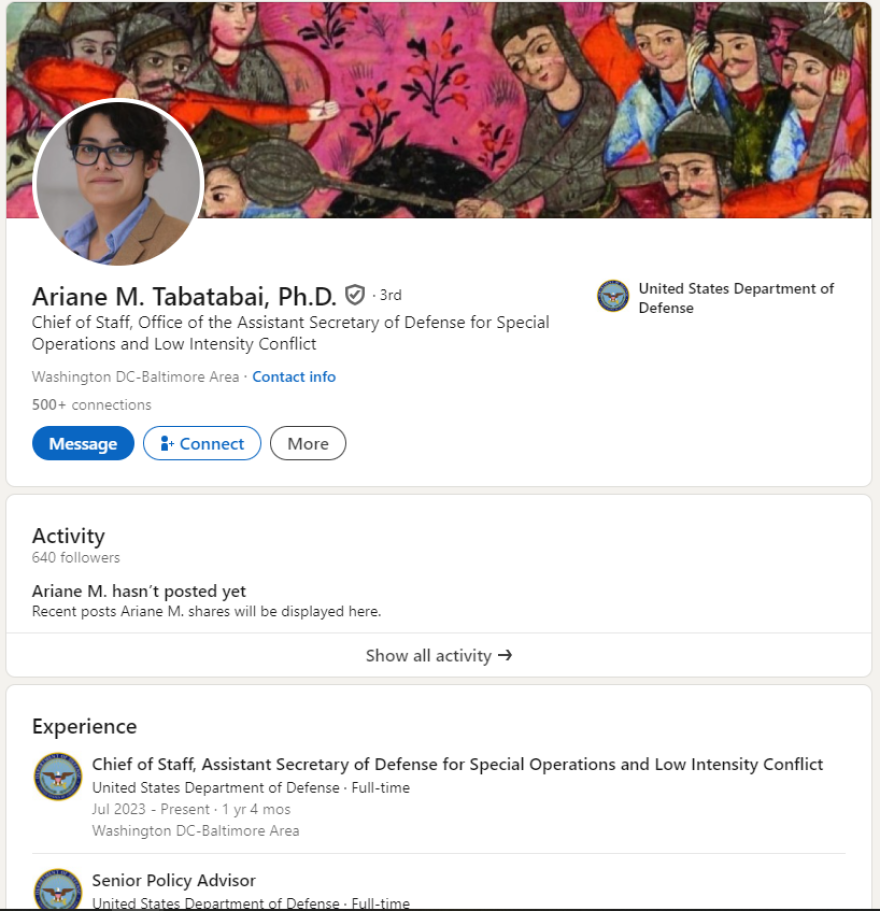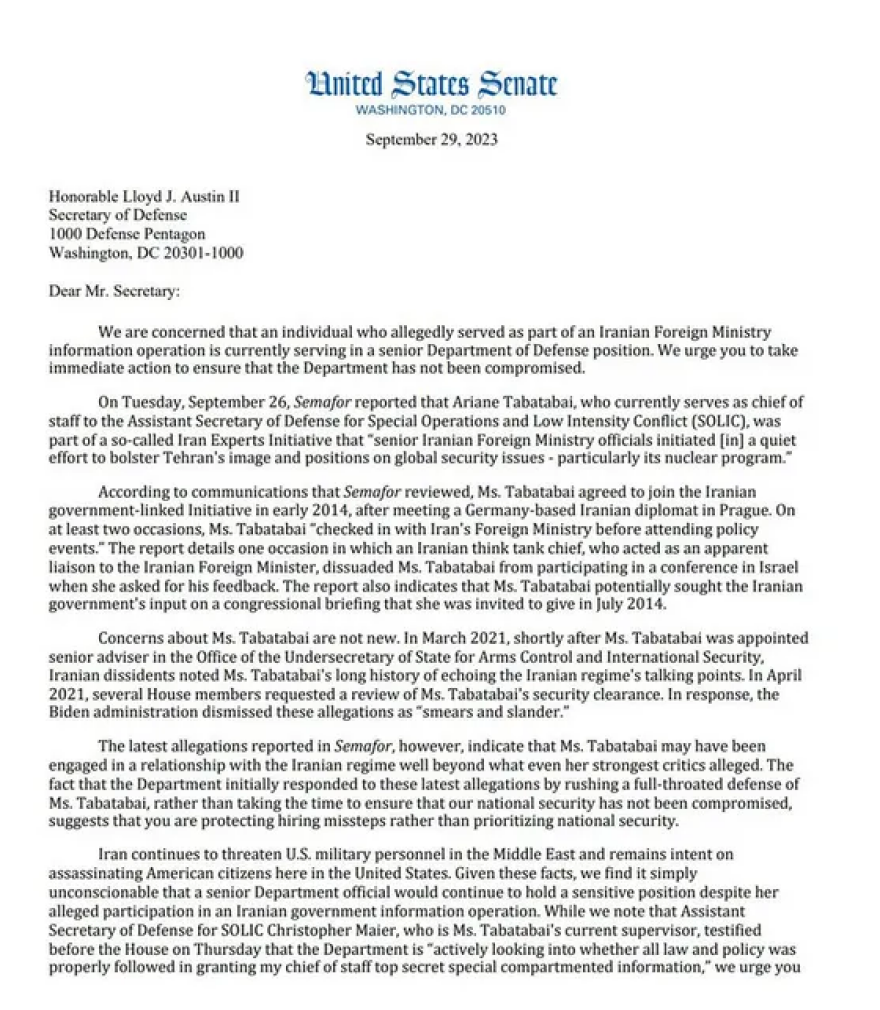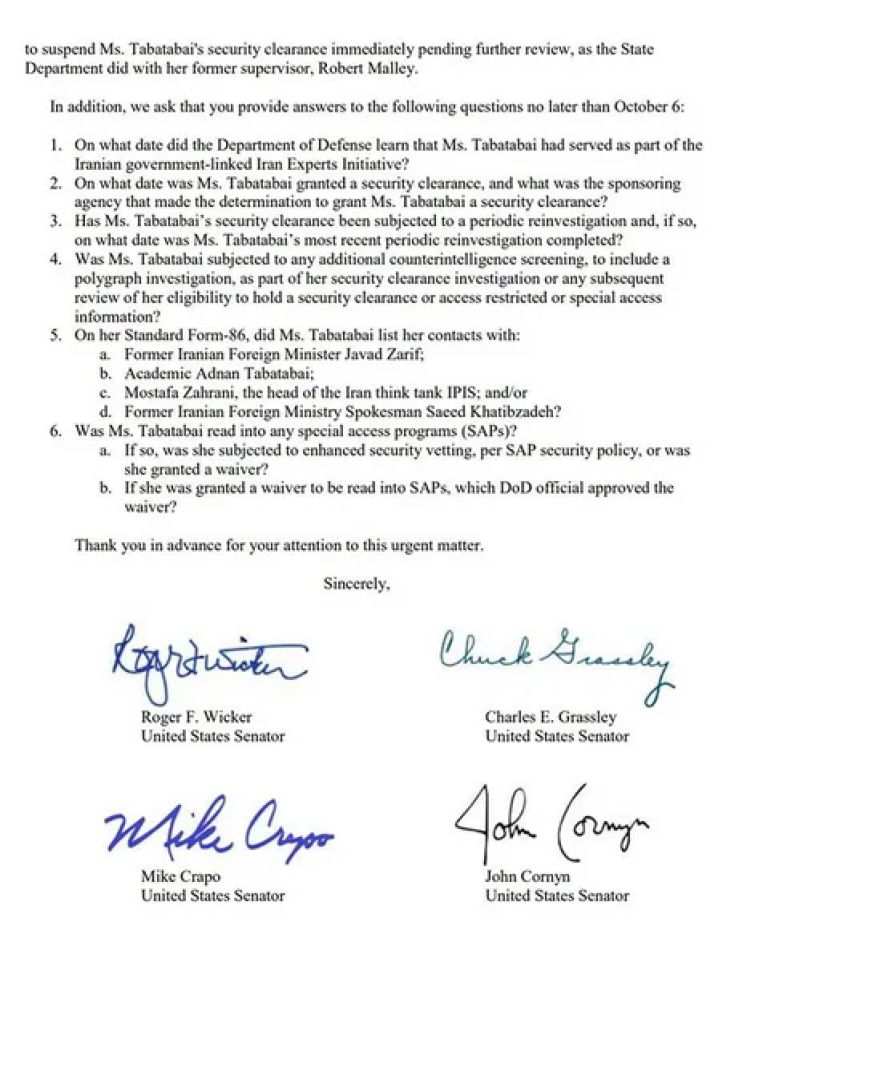A Pentagon official is being eyed by US authorities over the leak of documents that revealed scenarios Israel is considering for its attack response to Iran.
According to information that also comes from a letter sent to US Defense Secretary Lloyd Austin by US senators, it is Iranian-American Ariane Tabatabai. At the same time, Sky News Arabia reported that a US Pentagon official linked the two cases, saying that Tabatabai is among the people being investigated for the leak.
The official in question held a high-ranking position in the Department of Defense which, according to both her Linkedin and the senators’ letter, is titled “Chief of Staff to the Under Secretary of Defense for Special Operations and Low Intensity Conflict.”
See her LinkedIn profile:

According to what the senators said in their letter, which dates back to September 29, there was deep concern about Tabatabai as they accused her of being part of the so-called “Iran Experts Initiative”, which “senior Iranian Foreign Ministry officials launched in a quiet effort to bolster Tehran’s image and positions on global security issues – particularly its nuclear program”.
Senators Roger Wicker, Charles Grassley, Mike Crapo, and John Cornyn called on the Austin administration to take immediate action to ensure that U.S. security has not been undermined.
Wicker even pointed out in a post yesterday that he had called for Ariane Tabatabai’s security clearance to be suspended last year for her role in an Iranian intelligence operation. “Surprisingly, she’s still on the job,” he wrote, adding that “the latest apparent leak to an Iranian Telegram channel reflects the Biden-Harris administration’s tolerance for insider threats.
The same letter stressed the need for answers from the Pentagon by October 6, asking for details about Tabatabai’s security clearance (passport), her contacts with Iranian officials, and whether she had access to special access programs (SAPs).
See the senators’ letter to Lloyd Austin:


The issues surrounding Tabatabai are not new. In 2021, Iranian dissidents suggested that Tabatabai had a long history of repeating the rhetoric of the Iranian regime. At the time, several members of the House of Representatives called for a review of her security clearance, which the Biden administration rejected, calling it“slanderous and defamatory.”
However, new allegations suggest that Tabatabai’s ties to the Iranian regime may have been deeper than even her fiercest critics imagined, the senators say. “The fact that the Defense Department initially strongly defended Tabatabai without carefully considering whether national security had been breached caused further backlash.”
The senators urged Lloyd Austen to immediately suspend Tabatambay’s security clearance and demanded to know whether Tabatambay had undergone counterintelligence checks, such as truth tests, and whether her clearance was periodically reviewed.
It should be noted, however, that so far there has been no official confirmation that Tabatabhai is wanted or under investigation by authorities as part of the leak investigation.
Who is Ariane Tabatabhai
Ariane Tabatabai is an Iranian-American political scientist, author, and senior policy adviser at the United States Department of Defense. She is a graduate of King’s College London and the daughter of Javad Tabatabai, an Iranian philosopher and professor at Tehran University.
She is the son of Tehran’s Tehran University professor and a member of the Tehran Tehran University faculty.
Tabatabai is also a former researcher at the RAND Corporation think tank, director of the curriculum and associate professor of security studies at Georgetown University, an international political adviser to NATO and is involved in various research projects.
Tabatabai, in an article in Foreign Policy magazine ahead of the 2020 US presidential election, argued that Iran’s economy is fragile and will be forced to negotiate, agree and make concessions, demanding that the winning US presidential candidate not return to the nuclear deal and push for more points.
After taking office in the Biden administration in January 2021, he joined the US negotiating team in the Iran nuclear negotiations, but along with Richard Niphew he left the team after a few months due to disagreements with Robert Malley, the head of the US negotiating team, and also because he believed that the US would lift too many sanctions on Iran and thus the potential deal would not be strong enough.
Controversial positions
After Tabatabai was appointed to her position at the US State Department, she became the target of accusations on social media. These accusations about Tabatabai first appeared on Twitter, accusing her of surrendering to the Islamic Republic of Iran.
In September 2023, a large cache of Iranian government correspondence and emails, first reported by Semafor and Iran International, linked Tabatabai to the Iran Experts Initiative, an effort launched by senior Iranian Foreign Ministry officials to bolster Tehran’s image and positions on global security issues, particularly its nuclear program. He met regularly with senior Iranian officials. Iran International claimed that her report was a revelation and a surprise to the Pentagon.
In one of the leaked emails, she wrote to her contact at the Iranian Foreign Ministry and asked for his advice on whether she should work with officials in Saudi Arabia and attend a meeting in Israel. Her contact told Tabatabai to consider Saudi Arabia and avoid Israel.
FBI: We are investigating the leak of documents on Israeli retaliation against Iran
Meanwhile, the FBI, said it is investigating the leak of two top-secret intelligence documents describing Israel’s preparations for retaliation against Iran. White House spokesman John Kirby said it has not been determined whether the disclosure was hacked or leaked and that Joe Biden is closely monitoring the results of the investigation.
“We’re not exactly sure how these documents came to be made public,” he told reporters. “The president remains deeply concerned about any leak of classified information in the public domain. This should not happen and is unacceptable when it does.”
What the leak of classified documents from the US hides
White House spokesman John Kirby said President Biden is “deeply concerned” about the leak, but it has not yet been determined whether it is a hack or an internal leak.
The documents reportedly describe Israel’s preparations for a strike against Iran, with information gathered by the U.S. National Geospatial-Intelligence Agency on October 15 and 16. The leak of these documents is a serious national security issue as they reveal details of Israel’s preparations to attack Iran, a move that could lead to an escalation of tensions in the Middle East.
The BBC in its analysis attempts to outline all that has been known so far:
Are the documents authentic?
Military analysts who have reviewed the documents note that the language and headings used are consistent with similarly classified documents that have been disclosed in the past. The documents are marked “Top Secret” and bear the acronym “FGI,” which stands for “Foreign Government Intelligence.”
The documents appear to have been distributed to intelligence agencies of the “Five Eyes” alliance, which includes the US, UK, Canada, Australia and New Zealand. The acronym “TK” that appears in the documents refers to the term “Talent Keyhole,” a code that covers satellite-derived information related to the Signals Intelligence (SIGINT) and Imagery Intelligence (IMINT) services.What do the documents reveal?
The documents present a comprehensive U.S. intelligence assessment of Israel’s preparations to attack Iran, based on information collected on October 15 and 16 by the NGA. One of the main points of interest is reference to two air-to-ground ballistic missile (ABLM) systems: the Golden Horizon and Rocks.
The Rocks system is a long-range missile manufactured by the Israeli company Rafael that can hit targets both above and below the ground. The Golden Horizon appears to refer to the Blue Sparrow system, with a range of about 2,000 kilometers.
This report suggests that the Israeli air force intends to carry out a widespread attack, similar to the one it carried out in April on an Iranian radar near Isfahan. By launching the missiles from a long distance, Israel could avoid having to fly over neighboring countries such as Jordan.
However, the documents include no indication that Israel intends to activate its nuclear arsenal.As the BBC notes, at Israel’s request, the US government never publicly acknowledges that its close ally Israel has nuclear weapons, so this has caused some embarrassment in Washington.
What don’t the documents reveal?
Despite the revelations, the documents do not contain details about the targets Israel intends to hit or the timing of the attack. The U.S. government has expressed its opposition to attacks targeting Iranian nuclear facilities or oil infrastructure, which leaves Iranian military bases, particularly those belonging to the Revolutionary Guards Guards (IRGC) and the Basij force, as the most likely targets.
At the same time, the delay of the attack on the part of Israel is remarkable. Many expected the attack to have already taken place, especially after Israel’s promise of retaliation against Iran. However, as in April, when Iran responded with an attack of 300 drones and missiles after an Israeli strike on Damascus, Israel appears to be proceeding with caution, possibly due to US concerns about escalation just before the November presidential election.
Spill or cyberattack;
There are suspicions that the leak of these documents may have been deliberately done by someone who wanted to thwart Israel’s plans to attack Iran. Iran, which has sophisticated cyber warfare capabilities, is also a possible suspect for a cyber attack. If the documents are authentic, they demonstrate that despite the close defense relationship between the U.S. and Israel, Washington continues to closely monitor Israel’s military preparations.
Implications and Potential Escalation
Although it is not clear exactly when the attack will take place, information in the documents suggests that Israel is preparing for a widespread military strike. The Middle East is on edge, and if the attack takes place, it is expected to create a new period of extreme instability in the region.
Ask me anything
Explore related questions





